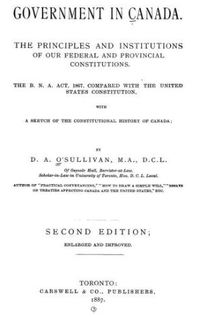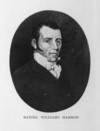
Source: Link
O’SULLIVAN, DENNIS AMBROSE, lawyer and author; b. 21 Feb. 1848 in Seymour Township, Upper Canada, youngest son of Michael O’Sullivan and Mary Henessey; m. 24 May 1881 Emma Mary Philamena Higgins in Oshawa, Ont., and they had six children; d. 13 Sept. 1892 in Penetanguishene, Ont., and was buried in Toronto.
Dennis Ambrose O’Sullivan attended St Michael’s College in Toronto from 1868 to 1870, graduating from the University of Toronto with a ba in 1872. After studying law with the firm of Blake, Kerr, and Bethune, he was called to the bar in 1875. The following year he received an llb from the university, with which he maintained an association throughout his life, eventually earning an ma and serving on its senate.
In 1875 O’Sullivan established his own legal practice in Toronto. He served as legal counsel to and spokesman for the Roman Catholic archdiocese of Toronto during the reigns of archbishops John Joseph Lynch* and John Walsh. Much of his work for the archdiocese was mundane, involving such matters as the propriety of parish deeds. Occasionally there was a controversial case. In one such in 1887, Murphy v. Farrelly, the family of a priest in the Kingston diocese contested the provisions of the cleric’s will. The great fear of the bishops of Kingston and Toronto was that during the hearing James Murphy, the priest’s father, who had renounced Catholicism, would make good a threat to expose a scandal involving two former bishops of Kingston. Following a compromise worked out by O’Sullivan the bishops were able to avoid the most serious implications of the controversy.
In his role as archdiocesan spokesman O’Sullivan was often called upon to speak out in situations where it would have been inappropriate for the archbishop to comment personally. A typical case occurred in 1887 when Irish nationalists invited Irish radical William O’Brien to Toronto to confront Governor General Lord Lansdowne [Petty-Fitzmaurice*], an Irish absentee landlord. In a letter to the Catholic Weekly Review, O’Sullivan helped to defuse any confrontation by suggesting that O’Brien was in the “secret pay” of Lansdowne and had “done him immense service.” Similarly it had been O’Sullivan, rather than the priests or the archbishop, who had written letters of commentary and refutation in response to the “no popery” campaigns spearheaded by the ultra-Protestant Toronto Daily Mail against separate schools in the provincial election of 1886 [see Christopher William Bunting] and who did so in subsequent contests at the federal and provincial levels.
As a confidant of the archbishops, O’Sullivan was often given charge of sensitive arrangements that necessitated an in-depth knowledge of ecclesiastical protocol. One such occasion was the banquet given by Archbishop Lynch in 1887 to celebrate the cardinalate of Quebec archbishop Elzéar-Alexandre Taschereau. A similar celebration arranged for the silver jubilee of Archbishop Walsh led in 1892 to a volume on the history of the archdiocese. Although the book was edited by Father John Read Teefy*, O’Sullivan oversaw the details of production and distribution.
O’Sullivan was a prolific author in his own right. His writings included legal tracts, texts on government, and philosophic works. These tended to the conventional. His pamphlet on systematic charity, for example, reveals nothing of an enlightened social reformer. Offering little by way of analysis, it reflects the dominant thought of the day regarding poverty. Thus, when the author advocates an agency to deal with poverty, it is “the deserving poor,” ill defined, who would be served. O’Sullivan was considered by the Peterborough Examiner, however, one of “the leading Roman Catholic litterateurs of the Dominion.” His best-known work, Essays on the church in Canada, originally separate articles, was published in 1890 and widely distributed by the Toronto branch of the Catholic Truth Society. According to obituaries, he was working on a history of the Roman Catholic Church in Canada at the time of his death.
O’Sullivan had remained in private practice until his death from typhoid fever in 1892, at which time he was in partnership with Francis Alexander Anglin*. He had served as a separate-school trustee and as chairman of the Toronto Public Library Board, and was awarded honorary doctorates by Université Laval (1887) and the College of Ottawa (1891).
The series of articles which forms Dennis Ambrose O’Sullivan’s Essays on the church in Canada (Toronto, 1890) first appeared in the American Catholic Quarterly Rev. (Philadelphia) between 1883 and 1888, and was reprinted in the Catholic Weekly Rev. (Toronto), beginning with its first issue of 19 Feb. 1887.
O’Sullivan’s other publications include: A manual of government in Canada: or, the principles and institutions of our federal and provincial constitutions (Toronto, 1879), a second edition of which was issued in 1887 under the title Government in Canada: the principles and institutions of our federal and provincial constitutions . . . ; A manual of practical conveyancing: real and personal property, including wills, with precedents, forms and references (Toronto, 1882); How to draw a simple will: with special information for clergymen and doctors, and instructions for executors in ordinary cases (Toronto, 1883); Systematic charity: paper read before the Canadian Institute, January 1885 ([Toronto, 1885]), also published in Pamphlets: letters of an Irish Catholic layman, ed. W. R. Harris (Dublin, 1896); and Canada: an address delivered on the 1st of July, 1889, in aid of the House of Providence, Dundas (Toronto, 1889).
ARCAT, L; W. Law Soc. of Upper Canada Arch. (Toronto), Rolls, 2: 4. St Gregory the Great Roman Catholic Church (Oshawa, Ont.), Reg. of marriages, 1859–1921: 11 (mfm. at ARCAT). UTA, P87-0046.(18). Jubilee volume, 1842–1892: the archdiocese of Toronto and Archbishop Walsh, [ed. J. R. Teefy] (Toronto, 1892), 364–65. Catholic Weekly Rev., 1887–92, esp. 19 Feb., 13, 24 March, 19 May 1887; 17 Sept. 1892. Irish Canadian (Toronto), 15, 22 Sept. 1892. Toronto World, 14 Sept. 1892. Cyclopædia of Canadian biog. (Rose and Charlesworth), vol.2. Univ. Laval, Annuaire (Québec), 1886–87: 78; 1887–88: 58. Univ. of Toronto, Calendar, 1891–92: 21, 23.
© 1990–2024 University of Toronto/Université Laval
Image Gallery

Cite This Article
Gerald J. Stortz, “O’SULLIVAN, DENNIS AMBROSE,” in Dictionary of Canadian Biography, vol. 12, University of Toronto/Université Laval, 2003–, accessed April 23, 2024, http://www.biographi.ca/en/bio/o_sullivan_dennis_ambrose_12E.html.
The citation above shows the format for footnotes and endnotes according to the Chicago manual of style (16th edition). Information to be used in other citation formats:
| Permalink: | http://www.biographi.ca/en/bio/o_sullivan_dennis_ambrose_12E.html |
| Author of Article: | Gerald J. Stortz |
| Title of Article: | O’SULLIVAN, DENNIS AMBROSE |
| Publication Name: | Dictionary of Canadian Biography, vol. 12 |
| Publisher: | University of Toronto/Université Laval |
| Year of publication: | 1990 |
| Year of revision: | 1990 |
| Access Date: | April 23, 2024 |












